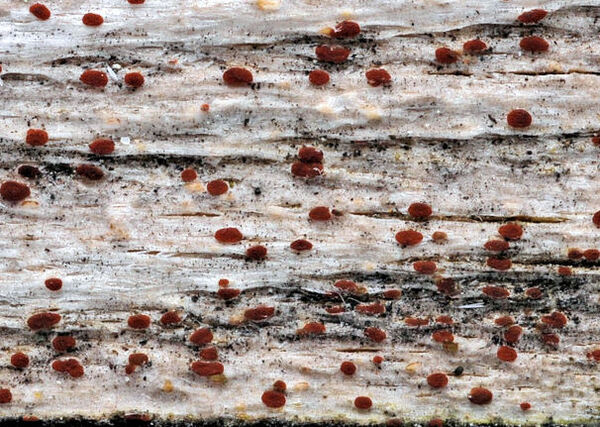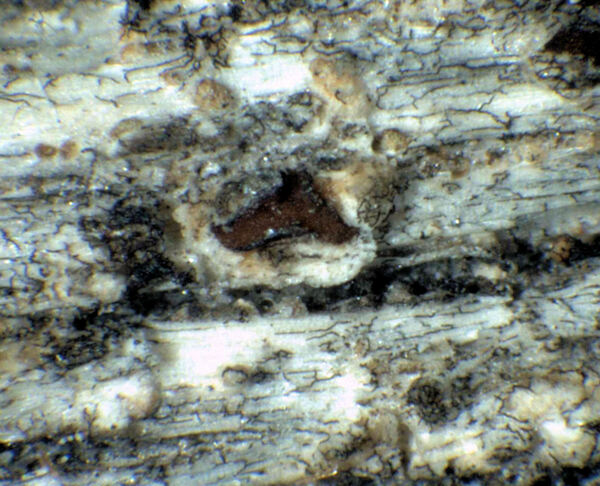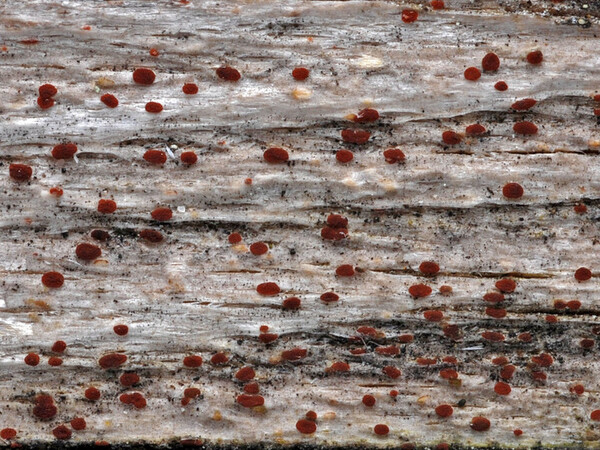Xylographa trunciseda (Th. Fr.) Redinger
Minks ex Redinger, Rabenh. Krypt.-Flora, 9, 2, 1: 216, 1938. Basionym: Lecidea trunciseda Th. Fr. - Lichenogr. Scand., 1: 467, 1874.
Synonyms:
Description: Thallus crustose, endosubstratic, with corticate, 10-40 μm wide goniocysts. Apothecia rugby-ball shaped (roundish to narrowly elliptical), often regenerating in chains from the outer tips of empty excipular shells, 0.2-3.9 x 0.09-0.24 mm, with a concave to flat, pale to dark brown disc, and a thin, brown, inconspicuous margin. Exciple of laterally interwoven hyphae, paraplectenchymatous in vertical section, 20-45(-67) μm wide, pale brown in outer part, colourless within; hymenium colourless to pale brown, easily separating from exciple, 60-85 μm high, I+ blue-green, then rust red; paraphyses slender, sparsely branched, 1.2-2 μm thick at midpoint, apically thickened to 3.5 μm, the apical cells sprawling over the disc; hypothecium colourless, 30-50(-70) μm high. Asci 8-spored, clavate-cylindrical, unitunicate, the gelatinous sheaths covering the walls amyloid, the tholus lacking internal amyloid structures, similar to that in Trapelia. Ascospores 1-celled, hyaline, ellipsoid, (8.5-)10-11(-13) x 4.5-7 μm. Photobiont chlorococcoid. Spot tests: K-, C-, KC-, P-. Chemistry: confriesiic acid, or without lichen substances.
Growth form: Crustose
Substrata: lignum
Photobiont: green algae other than Trentepohlia
Reproductive strategy: mainly sexual
Commonnes-rarity: (info)
Alpine belt: absent
Subalpine belt: very rare
Montane belt: very rare
Dry submediterranean belt: absent
Humid submediterranean belt: absent
Padanian area: absent
pH of the substrata:
1 2 3 4 5
Solar irradiation:
1 2 3 4 5
Aridity:
1 2 3 4 5
Eutrophication:
1 2 3 4 5
Poleotolerance:
0 1 2 3
Altitudinal distribution:
1 2 3 4 5 6
Rarity
absent
extremely rare
very rare
rare
rather rare
rather common
common
very common
extremely common
Loading data...
Occurrence data
Predictive map
Growth form: Crustose
Substrata: lignum
Photobiont: green algae other than Trentepohlia
Reproductive strategy: mainly sexual
Commonnes-rarity: (info)
Alpine belt: absent
Subalpine belt: very rare
Montane belt: very rare
Dry submediterranean belt: absent
Humid submediterranean belt: absent
Padanian area: absent
pH of the substrata:
| 1 | 2 | 3 | 4 | 5 |
Solar irradiation:
| 1 | 2 | 3 | 4 | 5 |
Aridity:
| 1 | 2 | 3 | 4 | 5 |
Eutrophication:
| 1 | 2 | 3 | 4 | 5 |
Poleotolerance:
| 0 | 1 | 2 | 3 |
Altitudinal distribution:
| 1 | 2 | 3 | 4 | 5 | 6 |
Rarity
absent
extremely rare
very rare
rare
rather rare
rather common
common
very common
extremely common
Loading data...
Occurrence data
Predictive map









